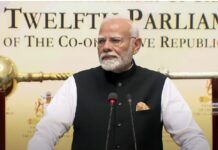India’s G20 Working Group on Disaster Risk Reduction is a significant step toward an inclusive, safer, collective future By Kamal Kishore and Susan Ferguson
Across the world, ever larger scales of lives, livelihoods, and infrastructure are exposed to geophysical hazards such as tsunamis and earthquakes, and to increasingly frequent and intense extreme climate and weather events. In an interconnected world, these leave no country and no economy untouched. Preventing these growing hazards from turning into disasters requires urgent solutions and unprecedented global cooperation.
India has taken a significant step toward strengthening international cooperation around disaster risk management by establishing a G20 Working Group on Disaster Risk Reduction under its G20 Presidency. This Group has brought together the world’s twenty largest economies to deliberate on strategies for building global resilience to disaster and climate risks.
The year 2023 is also significant as it marks the mid-point of the Sendai Framework for Disaster Risk Reduction 2015-2030. The Framework was adopted in 2015 by 187 nations, in recognition of the importance of disaster risk reduction for achieving the Sustainable Development Goals.
In 2016, Prime Minister Modi outlined a ten-point agenda for disaster risk reduction. A key area of emphasis within the ten-point agenda is women’s leadership in disaster risk management. In 2019, India’s National Disaster Management Authority (NDMA) revised the National Disaster Management Plan to include a number of gender-responsive measures – including requiring that homes constructed under post-disaster reconstruction programmes be jointly registered in the names of both male and female heads of families – and noting that post-disaster reconstruction should “provide opportunities to rebuild in a way that is inclusive of women and girls and provide opportunities for women to assume leadership roles”. Further, through its Aapada Mitra scheme, NDMA is working to train and mobilize one lakh citizen volunteer disaster responders across the country, of whom at least 25 per cent are women – and in some states up to 50 per cent of these volunteers are women.
The government carried this perspective over to the activities of the G20 Disaster Risk Reduction Working Group, which highlighted socially inclusive, locally-led, and gender-responsive approaches to DRR both in its deliberations and its outcome document. Through roundtable discussions the Working Group ensured that diverse perspectives were voiced and heard by G20 Member States when planning strategies for international cooperation in disaster risk management.
The role of women in disaster risk reduction and resilience
A focus on women’s participation and gender responsiveness is important for disaster risk reduction because women play a crucial role in strengthening local resilience to climate and disaster risks, and yet are especially vulnerable to these risks.
Consider for example how women in many coastal communities of India, such as the Sundarbans region, have led the restoration and sustained management of mangroves, thus addressing multiple overlapping risks. First, mangroves provide natural protection against cyclones, storm surges, and floods in coastal areas. Second, mangroves act as significant carbon sinks and thus contribute to climate change mitigation. Third, mangroves sustain local fish ecosystems, thus providing local communities with economic livelihoods and food security. Innumerable such initiatives undertaken by women across the world – particularly in countries of the Global South – demonstrate how women often have a nuanced understanding of linkages between the drivers of disaster risk, along with the capacity to organise effective management of these risks.
Yet this is also because the social norms that often our gender roles, often place women at the nexus of disaster and climate risks. For example, lack of water due to increasing duration and frequency of droughts increases women’s care work burden and disproportionately impacts their livelihood activities by forcing them to go farther to collect water. Further, women get inadequate coverage under risk insurance or post-disaster compensation schemes because they usually lack ownership over land and other productive assets. Women also face higher risks of gender-based violence in the aftermath of disasters. Thus women are valuable yet vulnerable stakeholders in the context of disaster risk reduction.
The G20 Indian presidency’s focus on women-led development has helped advance global action on inclusive disaster risk reduction by encouraging more countries to mobilize adequate resources – finances, technology, knowledge, and institutional capacity.
An urgent first step to effectively leverage these resources is investing in the capacity for sex, age, and disability disaggregated data collection and gender-responsive socioeconomic assessments, in both pre- and post-disaster settings. Further, training women to lead these efforts at the local level will not only help in collecting data given prevailing social norms, but will also provide more comprehensive information about the nature of local risk and resilience.
Next, it is critical to build upon this data by accelerating investments into the interventions being carried out by women and women’s collectives at the grassroots, and setting up institutional mechanisms for the participation of women in decision-making at local, national, and regional levels. These actions are key to transforming local sustainable development processes, building long-term collective resilience to disaster risks, and strengthening gender equality.
Over the next seven years, we must build on the opportunity created by the G20 India presidency to meet the targets of the Sendai framework by 2030, and leverage the voice, agency and leadership of women in disaster risk management. We hope that Brazil, which is assuming the G20 Presidency next year, will take forward the DRR Working Group’s legacy, and continue to champion the voices of women, Indigenous and local communities, and other vulnerable groups, for disaster planning and preparedness.
—
Authors:
Kamal Kishore is Member, National Disaster Management Authority, Govt. of India, and Chair of the G20 Disaster Risk Reduction Working Group
Susan Ferguson is the Country Representative for UN Women India
















